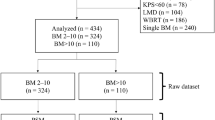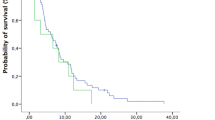Abstract
Aim
This study aimed to evaluate the clinical benefits of systemic therapy (ST) combined with stereotactic radiosurgery (SRS) for brain metastases (BM).
Methods
The patient data were extracted from the institutional disease database from 2016 to 2021. Surgical and whole-brain radiotherapy cases and poor Karnofsky performance status (KPS < 70) were excluded. The eligible patients were divided into monotherapy (SRS alone or ST alone) and combined therapy (SRS and ST, combined within a month). Univariate and multivariate Cox proportional hazards analyses were used to examine factors associated with increased risk of death and intracranial progression. The propensity score for selecting treatment was calculated based on existing prognostic covariates. Two groups were matched 1:1 and compared for intracranial progression-free survival (PFS) and overall survival (OS).
Results
We identified 1605 patients and analyzed 928 (monotherapy: n = 494, combined therapy: n = 434). In a multivariable model, the combined therapy was independently associated with improved PFS and OS relative to the monotherapy. At the median follow-up of 383 days in the matched dataset, the combined therapy group showed significantly longer PFS (median, 7.4 vs. 5.0 months, P < 0.001) and OS (median, 23.1 vs. 17.2 months, P = 0.036) than the monotherapy group. The overall intracranial progression and mortality risk was reduced in the combined therapy group, with an estimated HR of 0.70 and 0.78.
Conclusions
Combined therapy exhibited longer PFS and OS than monotherapy in BM patients. The results support the recent trend toward combining systemic and local therapies, encouraging future clinical trials.


Similar content being viewed by others
Data availability
Research data are stored in an institutional repository and anonymized numerical data will be shared upon request to the corresponding author. Research image data are not available at this time.
References
Vogelbaum MA, Brown PD, Messersmith H et al (2021) Treatment for brain metastases: ASCO-SNO-ASTRO guideline. J Clin Oncol. https://doi.org/10.1200/JCO.21.02314
Gondi V, Bauman G, Bradfield L et al (2022) Radiation therapy for brain metastases: an ASTRO clinical practice guideline. Pract Radiat Oncol. https://doi.org/10.1016/j.prro.2022.02.003
Ramakrishna N, Anders CK, Lin NU et al (2022) Management of advanced human epidermal growth factor receptor 2-positive breast cancer and brain metastases: ASCO guideline update. J Clin Oncol 40:2636–2655. https://doi.org/10.1200/JCO.22.00520
Magnuson WJ, Lester-Coll NH, Wu AJ et al (2017) Management of brain metastases in tyrosine kinase inhibitor-naïve epidermal growth factor receptor-mutant non-small-cell lung cancer: a retrospective multi-institutional analysis. J Clin Oncol 35:1070–1077. https://doi.org/10.1200/JCO.2016.69.7144
Dai L, Luo C-Y, Hu G-X et al (2020) Comparative analysis of first-line treatment regimens for advanced EGFR-mutant non-small cell lung cancer patients with stable brain metastases. Ann Palliat Med 9:2062–2071. https://doi.org/10.21037/apm-20-1136
Reungwetwattana T, Nakagawa K, Cho BC et al (2018) CNS response to osimertinib versus standard epidermal growth factor receptor tyrosine kinase inhibitors in patients with untreated EGFR-mutated advanced non-small-cell lung cancer. J Clin Oncol. https://doi.org/10.1200/JCO.2018.78.3118
Zhang Z, Guo H, Lu Y et al (2019) Anaplastic lymphoma kinase inhibitors in non-small cell lung cancer patients with brain metastases a meta-analysis. J Thorac Dis 11:1397–1409. https://doi.org/10.21037/jtd.2019.03.76
Murthy RK, Loi S, Okines A et al (2020) Tucatinib, trastuzumab, and capecitabine for HER2-positive metastatic breast cancer. N Engl J Med 382:597–609. https://doi.org/10.1056/NEJMoa1914609
Gori S, Puglisi F, Moroso S et al (2019) The HERBA study: a retrospective multi-institutional Italian study on patients with brain metastases from HER2-positive breast cancer. Clin Breast Cancer 19:e501–e510. https://doi.org/10.1016/j.clbc.2019.05.006
Lin NU, Pegram M, Sahebjam S et al (2021) Pertuzumab plus high-dose trastuzumab in patients with progressive brain metastases and HER2-positive metastatic breast cancer: primary analysis of a phase II study. J Clin Oncol 39:2667–2675. https://doi.org/10.1200/JCO.20.02822
Bailleux C, Eberst L, Bachelot T (2021) Treatment strategies for breast cancer brain metastases. Br J Cancer 124:142–155. https://doi.org/10.1038/s41416-020-01175-y
Long GV, Atkinson V, Lo S et al (2018) Combination nivolumab and ipilimumab or nivolumab alone in melanoma brain metastases: a multicentre randomised phase 2 study. Lancet Oncol 5877:579. https://doi.org/10.1016/S1470-2045(18)30139-6
Zhou Y, Wang B, Qu J et al (2020) Survival outcomes and symptomatic central nervous system (CNS) metastasis in EGFR-mutant advanced non-small cell lung cancer without baseline CNS metastasis: osimertinib vs. first-generation EGFR tyrosine kinase inhibitors. Lung Cancer 150:178–185. https://doi.org/10.1016/j.lungcan.2020.10.018
Petrelli F, Ghidini M, Lonati V et al (2017) The efficacy of lapatinib and capecitabine in HER-2 positive breast cancer with brain metastases: a systematic review and pooled analysis. Eur J Cancer 84:141–148. https://doi.org/10.1016/j.ejca.2017.07.024
Bachelot T, Romieu G, Campone M et al (2013) Lapatinib plus capecitabine in patients with previously untreated brain metastases from HER2-positive metastatic breast cancer (LANDSCAPE): a single-group phase 2 study. Lancet Oncol 14:64–71. https://doi.org/10.1016/S1470-2045(12)70432-1
Saura C, Oliveira M, Feng Y-H et al (2020) Neratinib plus capecitabine versus lapatinib plus capecitabine in HER2-positive metastatic breast cancer previously treated with ≥ 2 HER2-directed regimens: phase III NALA trial. J Clin Oncol 38:3138–3149. https://doi.org/10.1200/JCO.20.00147
Lin NU, Borges V, Anders C et al (2020) Intracranial efficacy and survival with tucatinib plus trastuzumab and capecitabine for previously treated HER2-positive breast cancer with brain metastases in the HER2CLIMB trial. J Clin Oncol 38:2610–2619. https://doi.org/10.1200/JCO.20.00775
Krop IE, Lin NU, Blackwell K et al (2015) Trastuzumab emtansine (T-DM1) versus lapatinib plus capecitabine in patients with HER2-positive metastatic breast cancer and central nervous system metastases: a retrospective, exploratory analysis in EMILIA. Ann Oncol 26:113–119. https://doi.org/10.1093/annonc/mdu486
Modi S, Saura C, Yamashita T et al (2020) Trastuzumab deruxtecan in previously treated HER2-positive breast cancer. N Engl J Med 382:610–621. https://doi.org/10.1056/NEJMoa1914510
Tonse R, Tom MC, Mehta MP et al (2021) Integration of systemic therapy and stereotactic radiosurgery for brain metastases. Cancers. https://doi.org/10.3390/cancers13153682
Suh JH, Kotecha R, Chao ST et al (2020) Current approaches to the management of brain metastases. Nat Rev Clin Oncol 17:279–299. https://doi.org/10.1038/s41571-019-0320-3
Gamboa-Vignolle C, Ferrari-Carballo T, Arrieta Ó, Mohar A (2012) Whole-brain irradiation with concomitant daily fixed-dose temozolomide for brain metastases treatment: a randomised phase II trial. Radiother Oncol 102:187–191. https://doi.org/10.1016/j.radonc.2011.12.004
Liu H-P, Zheng K-B, Wang J-W (2017) Efficacy and safety of temozolomide plus whole-brain radiotherapy in the treatment of intracranial metastases. J Cancer Res Ther 13:785. https://doi.org/10.4103/jcrt.JCRT_323_17
Schapira E, Hubbeling H, Yeap BY et al (2018) Improved overall survival and locoregional disease control with concurrent PD-1 pathway inhibitors and stereotactic radiosurgery for lung cancer patients with brain metastases. Int J Radiati Oncol*Biol*Phys 101:624–629. https://doi.org/10.1016/j.ijrobp.2018.02.175
Borius P-Y, Régis J, Carpentier A et al (2021) Safety of radiosurgery concurrent with systemic therapy (chemotherapy, targeted therapy, and/or immunotherapy) in brain metastases: a systematic review. Cancer Metastasis Rev 40:341–354. https://doi.org/10.1007/s10555-020-09949-9
Ramakrishna R, Formenti S (2019) Radiosurgery and immunotherapy in the treatment of brain metastases. World Neurosurg 130:615–622. https://doi.org/10.1016/j.wneu.2019.04.032
Kraft J, van Timmeren JE, Frei S et al (2022) Comprehensive summary and retrospective evaluation of prognostic scores for patients with newly diagnosed brain metastases treated with upfront radiosurgery in a modern patient collective. Radiother Oncol. https://doi.org/10.1016/j.radonc.2022.04.024
Lin NU, Lee EQ, Aoyama H et al (2015) Response assessment criteria for brain metastases: proposal from the RANO group. Lancet Oncol 16:e270–e278. https://doi.org/10.1016/S1470-2045(15)70057-4
Zhu J, Sharma DB, Gray SW et al (2012) Carboplatin and paclitaxel with vs without bevacizumab in older patients with advanced non-small cell lung cancer. JAMA 307:1593–1601. https://doi.org/10.1001/jama.2012.454
Takekuma M, Takahashi F, Mabuchi S et al (2020) Propensity score-matched analysis of systemic chemotherapy versus salvage hysterectomy for persistent cervical cancer after definitive radiotherapy/concurrent chemoradiotherapy. BMC Cancer 20:1169. https://doi.org/10.1186/s12885-020-07672-w
Sperduto PW, De B, Li J et al (2022) Graded prognostic assessment (GPA) for patients with lung cancer and brain metastases: initial report of the small cell lung cancer GPA and update of the non-small cell lung cancer GPA including the effect of programmed death ligand 1 and other prognostic factors. Int J Radiat Oncol Biol Phys. https://doi.org/10.1016/j.ijrobp.2022.03.020
Sperduto PW, Mesko S, Li J et al (2020) Survival in patients with brain metastases: summary report on the updated diagnosis-specific graded prognostic assessment and definition of THE eligibility quotient. J Clin Oncol 38:3773–3784. https://doi.org/10.1200/JCO.20.01255
Patrikidou A, Chaigneau L, Isambert N et al (2020) Development of a disease-specific graded prognostic assessment index for the management of sarcoma patients with brain metastases (Sarcoma-GPA). BMC Cancer 20:117. https://doi.org/10.1186/s12885-020-6548-6
Geraud A, Xu HP, Beuzeboc P, Kirova YM (2017) Preliminary experience of the concurrent use of radiosurgery and T-DM1 for brain metastases in HER2-positive metastatic breast cancer. J Neurooncol 131:69–72. https://doi.org/10.1007/s11060-016-2265-z
Hatten SJ Jr, Lehrer EJ, Liao J et al (2022) A patient-level data meta-analysis of the abscopal effect. Adv Radiat Oncol 7:100909. https://doi.org/10.1016/j.adro.2022.100909
Lin X, Lu T, Xie Z et al (2019) Extracranial abscopal effect induced by combining immunotherapy with brain radiotherapy in a patient with lung adenocarcinoma: a case report and literature review. Thorac Cancer 10:1272–1275. https://doi.org/10.1111/1759-7714.13048
Silk AW, Bassetti MF, West BT et al (2013) Ipilimumab and radiation therapy for melanoma brain metastases. Cancer Med 2:899–906. https://doi.org/10.1002/cam4.140
Kotecha R, Kim JM, Miller JA et al (2019) The impact of sequencing PD-1/PD-L1 inhibitors and stereotactic radiosurgery for patients with brain metastasis. Neuro Oncol 21:1060–1068. https://doi.org/10.1093/neuonc/noz046
Yang Y, Deng L, Yang Y et al (2022) Efficacy and safety of combined brain radiotherapy and immunotherapy in non-small-cell lung cancer with brain metastases: a systematic review and meta-analysis. Clin Lung Cancer 23:95–107. https://doi.org/10.1016/j.cllc.2021.06.009
Chen L, Douglass J, Kleinberg L et al (2018) Concurrent immune checkpoint inhibitors and stereotactic radiosurgery for brain metastases in non-small cell lung cancer, melanoma, and renal cell carcinoma. Int J Radiat Oncol Biol Phys 100:916–925. https://doi.org/10.1016/j.ijrobp.2017.11.041
Acknowledgements
The authors thank all the patients, investigators, and institutions involved in this study.
Funding
YK has received research funding from JSPS (Grant Number 20K16402), Aichi Cancer Research Foundation, and The Hori Science and Arts Foundation.
Author information
Authors and Affiliations
Contributions
YK collected the data and wrote the main manuscript. NN, RM, TK, TA, HS, HT, TK collected the data and supervised the study. All authors reviewed and approved the final manuscript.
Corresponding author
Ethics declarations
Competing interest
YK has received research funding from JSPS, Aichi Cancer Research Foundation, and The Hori Science and Arts Foundation. TK has speaker bureau from Hitachi Co., Bristle Myers Squibb., Accuray Co., Elekta Co., Ono Pharmaceutical Co., AstraZeneca Co., Taiho Pharmaceutical Co., Canon Co., and Janssen Pharmaceutical Co.
Additional information
Publisher's Note
Springer Nature remains neutral with regard to jurisdictional claims in published maps and institutional affiliations.
Supplementary Information
Below is the link to the electronic supplementary material.
Rights and permissions
Springer Nature or its licensor holds exclusive rights to this article under a publishing agreement with the author(s) or other rightsholder(s); author self-archiving of the accepted manuscript version of this article is solely governed by the terms of such publishing agreement and applicable law.
About this article
Cite this article
Koide, Y., Nagai, N., Miyauchi, R. et al. Radiotherapy or systemic therapy versus combined therapy in patients with brain metastases: a propensity-score matched study. J Neurooncol 160, 191–200 (2022). https://doi.org/10.1007/s11060-022-04132-2
Received:
Accepted:
Published:
Issue Date:
DOI: https://doi.org/10.1007/s11060-022-04132-2




